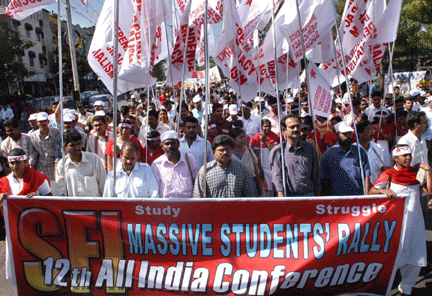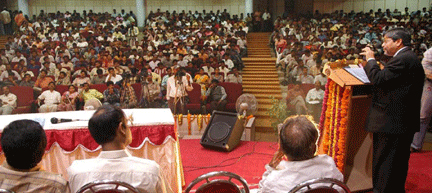 People's Democracy
People's Democracy
(Weekly
Organ of the Communist Party of India (Marxist)
No. 49
December 04, 2005
(Weekly
Organ of the Communist Party of India (Marxist)
|
Vol.
XXIX
No. 49 December 04, 2005 |
SFI Scales New Height With 12th Conference

SCALING a new height for the Students Federation of India (SFI), its 12th all-India conference at Comrade P Sundarayya Nagar, Hyderabad, was indeed historic in more than one way.
It
was for the first time that an SFI conference was held in Hyderabad and second
time an all-India conference was organised in Andhra Pradesh after the 6th SFI
conference held in Vijayawada in 1986, a good 20 years back. The entire
organisational machinery of the SFI’s Andhra Pradesh state committee had taken
it as a challenge to ensure the conference a success. The reception committee,
with C Ramaiah as chairman, had divided itself into 17 sub-committees to ensure
that the conference sessions ran smoothly, without any hassles. More than 300
volunteers worked day in and day out to execute the reception committee’s
planning. Above all, it was perhaps for the first time in the SFI history that
its cadres collected the entire sum incurred for the conduct of the conference.
Moving away from these minor details, what stands out was the historic rally that was organised on the first day of the conference. Around one lakh students from all parts of Andhra Pradesh gathered in Hyderabad, braving the unusually chilly conditions then prevailing in the state. They came travelling for more than 12 hours in tightly packed unreserved compartments, some getting just enough space to sit while most of them travelled standing. Students from the districts adjoining Hyderabad came in lorries and mini vans. Most of them were from humble backgrounds and from government schools, colleges and hostels. They fought with the police and railway authorities who tried to block their journey and stop them from reaching Hyderabad. The simple reason that made them brave these hardships and participate in the rally was their immense faith and confidence in SFI.
The
massive students procession was led by members of the SFI central secretariat,
followed by 12 girl students in uniform carrying 12 flags to signify the 12th
conference. Then followed tribal students carrying bows and arrows to show their
resolve to continue the struggle against commercialisation and communalisation
of education. Immediately after them came students beating drums and dancing to
the rhythm of the music, followed by delegates and then by a huge mass of
students from Andhra Pradesh. Banners proclaiming various demands of the
movement and SFI flags made the rally extremely colourful. It took more than an
hour for the entire mass of the students to reach the venue of the public
meeting. The tail of the procession was still at the starting point when the
head had already reached the public meeting ground, covering a distance of
nearly 2 km.
ENTHUSIASM
GENERATED
The rally was addressed by West Bengal chief minister Buddhadeb Bhattacharya, former SFI president Sitaram Yechuri, former Andhra SFI president B V Raghavulu, SFI general secretary Kallol Roy, SFI central secretariat member Albeena Shakil, Andhra SFI secretary Hari Kishore and Arun Kumar. SFI president K K Ragesh presided.
Sitaram Yechuri spoke about the changed political scenario and the need for Indian students to unite and fight for their rights. He said the increased strength of the Left in parliament ensured it a major role in the formation of the government and enables it to press the government towards pro-people policies, with the rural employment guarantee act being an example of the Left intervention. He, however, said that only through popular struggles could the government be forced to extend this act to the whole of the country, covering both the rural and urban areas. He urged the students, who constitute more than 50 per cent of the country’s population, to be sensitive to the needs of our society and build popular struggles for the people’s welfare.

Planning Commission member and former Mumbai University VC Prof B L Mungekar inaugurating the conference
The second day of the conference saw the inauguration of the delegates session in Comrade P Sundarayya Nagar, a beautifully decorated auditorium in the heart of Hyderabad. SFI president K K Ragesh hoisted its flag, after which hundreds of balloons were released in the air amid slogan shouting by the delegates. Then, Kallol Roy, Ragesh, former SFI president Y Venkateswara Rao, B V Raghavulu, C Ramaiah, members of the central secretariat, delegates and observers placed wreaths at the martyrs column. All this while, singers of the Praja Natya Mandali, a cultural organisation of the state, sang songs in memory of the martyrs.
After the conference had paid homage to the martyrs and condoled the death of hundreds of people who lost their lives to a just cause, reception committee chairman C Ramaiah welcomed the delegates to the land of historic Telangana armed struggle led by legendary P Sundarayya. He briefly traced the recent changes that are taking place in education sector and urged the students to launch powerful struggles to ensure that education reaches the poor masses instead of becoming a privilege of the few.
The
inauguration was given a colourful touch with highly energetic cultural
performances by the artists of Praja Natya Mandali. They rhythmically beat their
drums (called dappu in local parlance)
and created many sounds and even slogans like ‘SFI Zindabad’ on their
instruments. The highlight of their performance was the human pyramids they
formed while continuing their drum beating. Their performance brought most of
the delegates on to their feet, dancing to the music.
In the second session of the day, Kallol Roy proposed an 8-member presidium and various committees for the conduct of the conference, which delegates adopted unanimously. The central secretariat acted as the steering committee. As the general secretary of the organisation, Kallol Roy tabled the political organisational report before the conference, analysing the changed political scenario of the day compared to that prevalent at the time of the SFI’s last conference at Kozhikode. The defeat of BJP led NDA in parliamentary elections and the growing popularity of the Left forces in the country stand prominently in this change. He highlighted the various possibilities that open up before the student movement for an effective intervention and solution to the various problems facing the students. The report also highlighted the SFI’s growing organisational strength as reflected in the increasing membership enrolment figures. It lauded the struggles of students across the country from Rajasthan to Assam and Himachal to Kerala, and also self-critically addressed the problem of attaining a uniform growth in the country.
More than 40 comrades took part in the discussion that spanned over more than 7 hours. The comrades taking part in the discussions talked both about the changes that are taking place in the education system in their respective states and also the interventions the respective state committees have made. There were also some important suggestions for further expansion and growth of the organisation. For the first time in the history of the student movement, simultaneous translation facility was arranged at this conference enabling the delegates to express their views in their respective mother tongues. The discussion concluded on the last day of the conference with summing up by the general secretary, when the report was adopted unanimously. The conference also adopted many resolutions on the educational and political conditions of the day.
Another
highlight of the conference was the celebration of the formation of SFI 35 years
ago. A special session on “35 Years of Study, Struggle and Sacrifice” was
organised with all the former general secretaries and presidents.
The
conference also adopted a constitutional amendment to raise the membership levy
from college students to Rs 2 while it remains unchanged at Re 1 for school
students. The conference concluded with the election of a 78-member central
executive committee and a 17-member central secretariat. It thanked those
relieved for their invaluable contribution to the SFI’s growth, resolved to
carry forward their tradition and applauded the efforts of the reception
committee and its volunteers in making the event a success.